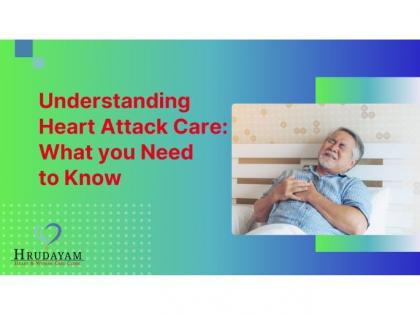Understanding Heart Attack Care: What You Need to Know
By Impact Desk | Updated: December 30, 2024 17:58 IST2024-12-30T17:58:00+5:302024-12-30T17:58:41+5:30
Cardiac deaths are currently among the major fatalities in the world. However, if urgent and the right treatment is ...

Understanding Heart Attack Care: What You Need to Know
Cardiac deaths are currently among the major fatalities in the world. However, if urgent and the right treatment is given, the consequences can be reduced. Therefore, the availability of skilled doctors and hospitals at your doorstep or in your city, Nagpur and its surrounding area, can save many precious lives. Heart attack is always a serious condition, and the only way to remedy it is prompt action that should be started just in time. Chest pain is one of the symptoms, and the patient may also feel shortness of breath, and discomfort in the arms, back, neck, or jaw. Immediate medical care is essential to avoid worsening the condition. Most of Nagpur’s hospitals have advanced facilities for angiography, angioplasty, and stenting, ensuring effective heart attack care.
Almost every city-based hospital has operational emergency services day and night, with entities specializing in cardiac care. These facilities not only provide emergency services but also educate patients about heart problem prevention through proper management of high blood pressure, cholesterol, and diabetes. Regular visits to a Cardiologist in Nagpur can significantly reduce heart attack risks and promote healthier lifestyles.
Role of Medicine in Heart Attack Care
Medications play a vital role in managing heart attacks and improving recovery. Blood thinners like aspirin and anticoagulants help prevent further clot formation. Beta-blockers and ACE inhibitors are prescribed to reduce heart strain and improve blood flow. Cholesterol-lowering medications, such as statins, help prevent future complications. Timely administration of these medicines can significantly improve survival rates and recovery.
Key Risk Factors for Heart Attacks
Knowing the triggers for heart attacks can help you avoid them. Some factors, such as age and family history, cannot be altered. However, lifestyle-related factors can be managed:
Bad Eating Habits: Excessive fatty, sugary, and processed foods clog arteries.
Lack of Exercise: Physical inactivity weakens the heart and can lead to obesity.
Smoking and Drinking Alcohol: Both damage blood vessels, increasing heart attack risk.
Stress: Prolonged stress harms the heart.
Adopting healthy habits and scheduling regular health check-ups can significantly lower your heart attack risk.
Recognizing a Heart Attack
Acting quickly during a heart attack is critical. Common symptoms include:
Chest pain or pressure that persists.
Trouble breathing, with or without chest discomfort.
Pain radiating to the arms, back, neck, jaw, or stomach.
Nausea, sweating, or dizziness.
If you suspect a heart attack, call emergency services immediately. The patient can take aspirin (if not allergic) and should stay calm until help arrives. Basic first aid knowledge can also be lifesaving.
Role of Angiography and Angioplasty
Angiography and angioplasty are life-saving procedures in heart attack care. Angiography is used to visualize blockages in coronary arteries, allowing doctors to identify the exact problem. Angioplasty, on the other hand, is a minimally invasive procedure that uses a balloon to open blocked arteries and restore blood flow. Often paired with stenting, it reduces the risk of future heart attacks and improves recovery outcomes. Hospitals in Nagpur are equipped to perform these procedures, ensuring timely and effective intervention.
The Importance of Early Intervention
Early intervention is key to minimizing heart damage and saving lives. Seeking medical care as soon as symptoms appear allows doctors to restore blood flow quickly, reducing complications. Early use of medications, angiography, and angioplasty can prevent irreversible damage to the heart. Awareness and swift action can make a life-or-death difference.
Heart Attack Care: Tips for Prevention and Recovery
The good news is that some heart attacks can be prevented:
Eat Healthy: Focus on whole grains, lean fish, healthy oils, fresh fruits, and vegetables.
Stay Active: Exercise for 30 minutes daily or 150 minutes weekly.
Get Regular Check-ups: Manage cholesterol, blood pressure, and sugar levels.
Control Stress: Use yoga, meditation, and deep breathing to stay calm.
Drink Water: Proper hydration supports heart health.
If you’ve had a heart attack, follow your doctor’s advice, take prescribed medicines, and consider joining a rehabilitation program. As a part of our mission for Heart Attack Care in Nagpur, we believe that Support Groups can also provide emotional strength during recovery.
Conclusion
Caring for your heart involves preventing problems and acting quickly when necessary. Recognizing risks, watching for warning signs, and seeking help promptly can save lives.
If you are in Nagpur, excellent healthcare facilities with experienced doctors are available. Regular check-ups with a cardiologist in Nagpur will help you care for your heart. Heart Attack Care starts with small but meaningful changes—eating
Open in app